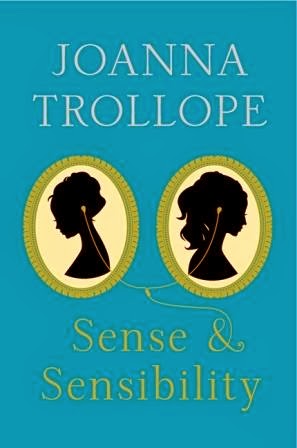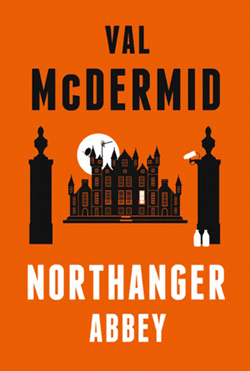
‘Sense and Sensibility’ – by Joanna Trollope?
Doesn’t sound right, does it? How about ‘Northanger Abbey’ – by Val McDermid? Meet The Austen Project: six well-known authors are ‘reworking’ Jane Austen’s six completed novels. Why? Erm…because they can? This isn’t a new phenomenon by any means, and there are still fewer rewrites of Austen than there are of Shakespeare. Of course, Shakespeare’s works were themselves rewrites – but more on that later.
Inevitably, the Internet has buzzed with outraged comments that the six chosen authors – and definitely publishers HarperCollins, whose brainchild this appears to be – are lazy and only after easy money. Of course The Austen Project is at least partly a commercial exercise, and such “criticism” is a strange way to insult the scheme. (It would be an odd publisher or author who didn’t want to make money.)

Yes, Austen can be used to sell anything.
There is truth in the claim that just sticking the words ‘Jane Austen’ on a book (or pencil case or pillow case) is a rather lazy way of selling something, but such is the way of the world. Perhaps we simply expect better of our authors, especially when they interfere with Literature, (especially Literature written by a Woman because, let’s face it, there’s not much of that in the cannon,) but everyone has to live…and likes to live very well if they can. In fact, these are lazy criticisms.

iPods and Alfa Romeos: Trollope updates ‘Sense and Sensibility’
Other aggrieved souls want to know where all the original writing has gone and how these terrible copycats dare to call themselves authors. I would argue that truly original stories, already a unicorn, were dealt a death blow by the invention of the printing press and development of mass literacy. Obviously, those were Good Things and, actually, something being rare doesn’t always make it valuable. All new books consist of bits of old plots stuck together in varying ways that will hopefully differentiate them from their neighbours.
This recycling only horrifies modern readers; until the 18th century readers expected and were expected to be familiar with the plot of “new” books and plays as writers simply took existing plots and re-told them in inventive ways. No 15th century play-goer criticised Shakespeare because they already knew the ending of ‘Romeo and Juliet’. After all, Shakespeare, one of the most successful copycats ever, got the plot for R&J from William Painter and Arthur Brooke, who themselves wrote differing versions of an old Italian folk-tale. If it was good enough for Shakespeare…
Besides, if already knowing the plot was a Truly Awful Thing, then no-one would ever re-read books they had previously enjoyed. (Just try telling your two year old that there’s no point reading ‘Giraffes Can’t Dance’ again because they already know the ending.) Some books become comfort food, to be dipped in and out of when you’re tired or grouchy. For many of her keenest readers, Austen’s books are exactly that.

Some novels become comfort food and reward repeat readings.
Obviously some books don’t stand up to a second reading, for whatever reason, but the New Austens may actually have an advantage here – you are (sort-of) re-reading a plot which will have changed, perhaps in some small particulars, perhaps in some significant ones, since the last time you ‘read’ it. Even if you are annoyed you are unlikely to be bored.
Finally, complaints ring out about the sheer arrogance of these upstart authors who think they can improve upon Austen’s works. I’m not sure Austen herself cares, what with being dead for quite a few years. More importantly, the updated novels are not intended to replace or improve upon the originals but to sit beside them – if anything, they may bring new audiences to enjoy the originals. And if they’re awful? Well, no one HAS to read them…
…but they will, inevitably, gain a large readership, even if they turn out to be poor impersonations. Fans will read them. I’ll read them. Initial reviews of Trollope’s ‘Sense and Sensibility’ are largely positive and I am genuinely interested to see how Val McDermid, a very successful crime writer, tackles ‘Northanger Abbey’, which operates as a criticism and parody of gothic novels and their tropes.

Will McDermid turn Austen’s gothic parody into a Gothic Nightmare?
Do we need more versions of ‘Emma’ or ‘Mansfield Park’? No. Is any harm being done? Absolutely not. Austen’s reputation will be undiminished, even if some of the novels don’t quite work, and hardly anyone is going to read Alexander McCall Smith’s ‘Emma’ instead of Austen’s. In fact, the modern works will likely act as bridges to the originals for those who might never have considered reading them.
The bigger question is: will the new versions work? While Austen’s themes are still relevant today, social rules have changed dramatically. In the nineteenth century a man and a woman exchanging letters were considered to be engaged. The quickest a reply to a letter could be expected was by return post. How does a modern author reconcile details like these, which underpin various aspects of plotting, with a world connected by instant communication? I can only assume the answer to be ‘with a lot of thought and some difficulty’.
Perhaps the Austen Project should be renamed the Austen Challenge.
4 Comments
Isn’t McCall Smith the author of Emma? Northanger Abbey was fun too.
Yes! Thanks for the comment; point noted and post amended accordingly. I did enjoy ‘Northanger Abbey’, but I love Val McDermid’s books so that’s not too surprising. I am still putting off reading ‘Emma’ and ‘Eligible’, though I’m sure I will one day out of sheer curiosity.
I have Emma, Northanger Abbey and Sense & Sensibility rewrites. Have the other three been published yet?
Pride and Prejudice was published as ‘Eligible’ by Curtis Sittenfeld a few years ago, but there’s no mention of Mansfield Park or Persuasion receiving the same treatment. It seems the project has quietly died.